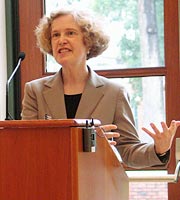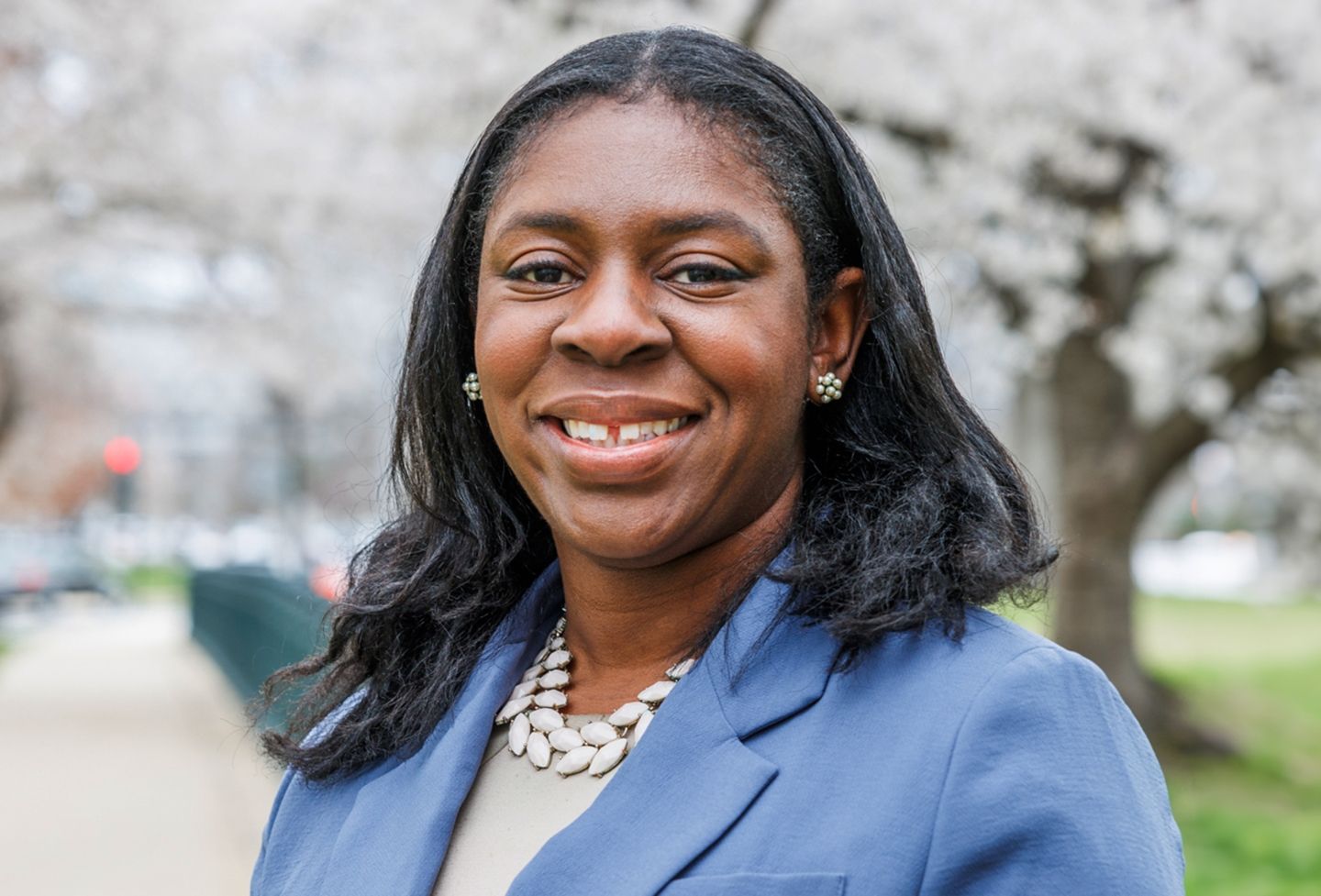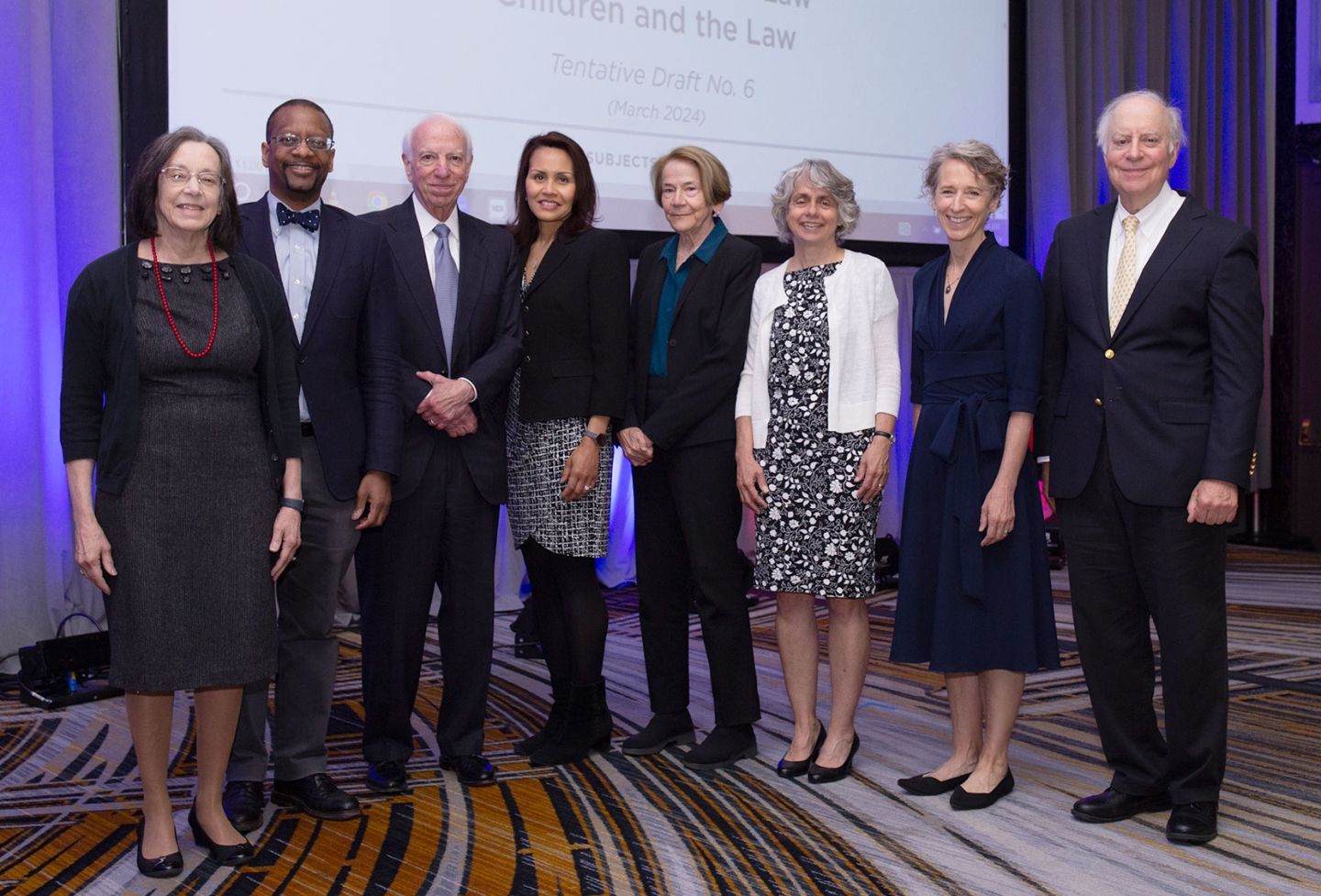Dresser: Complete Autonomy Not the Solution for Dementia Patients

Whether or not to offer life-sustaining treatment for those suffering from dementia should not be a decision left entirely to the patient, said Professor Rebecca Dresser at the 11th annual P. Browning Hoffman Memorial Lecture in Law and Psychiatry Oct. 11 at the Law School.
"We need to accept that we cannot exercise firm control over our later medical care," said Dresser, Daniel Noyes Kirby Professor of Law and Professor of Ethics in Medicine at Washington University in St. Louis, and a member of the President's Council on Bioethics.
Life-extending intervention is an issue many families deal with on a daily basis, ranging from public events such as the controversy over Terri Schiavo earlier this year to more private, personal matters of familial responsibility. This becomes even more complex when dementia plays a role in an incapacitated family member's health.
"Besides being a personal and family problem, this is a big and expanding social problem," Dresser said. "There is a large and soon-to-be larger population of people affected by dementia and we are far from ready to cope."
The debate over how to ethically treat patients on life support is fairly recent, and traces to the 1960s and 1970s, when the development of respirators and advanced ICU care introduced new ways to sustain life. To prevent patients from being kept alive for an unreasonably long time, living wills and advanced directives were established so a patient's own judgment could influence decisions to end his or her life support.
"The philosophical support for advanced directives is generally based on respect for individual autonomy," Dresser said. "The advanced directive approach is also attractive because it seems to avoid putting the decision in the hands of others — people like doctors and family members."
Dresser said that unfortunate philosophical and legal problems complicate what would seem to be a simple and straightforward matter. Despite their promotion, most people do not make living wills. When patients do compose directives for how they are to be treated if incapacitated and on life support, these directives are often brief and fail to offer specific advice, and as a result may not accurately reflect the patient's wishes.
Patients also may not understand the ramifications of their decision. "A particular problem with dementia is that people making a directive may not envision how they would experience their lives with dementia in the future," she said.
"So the question becomes: [Can] people completing advanced directives imagine what they would want in a future state of dementia or other impairment when they won't have the same concerns that they have now?"
Dresser suggested recognizing a balance between the need to protect vulnerable or incapacitated patients and the need to respect current disability laws. Individual autonomy should not always trump these notions.
Two standards should apply when patients do not provide clear instructive directions, both of which have not been fully developed, she said. The first is substituted judgment, which "instructs patients and families to make the decisions the patient would make if 'miraculously lucid for an interval.'" In cases where no clear advanced directive is present, decisions are made based on values such as religion and views towards medical care. A problem with this approach is the potential ease with which a relative might make decisions based on his or her own values, and not necessarily the patient's.
An alternative to this is the second standard, the "best-interest objective." With this standard, everyone involved agrees that they have no way of understanding what the patient would want. Decisions are made based on "community norms": perspectives taken from a reasonable sample of the majority, who make a choice based on how they would choose for themselves.
"I would like for us to get better about this objective approach [but] this is not going to be easy," she said. "Should we allow the values of reasonable healthy people to enter into decisions about someone like a person with moderate dementia who's not concerned about dignity and seems to be okay with the kind of life he or she has?
"People who support this expansive version of the objective test standard have to ask, how expansive area we going to get?" she said.
Dresser suggested mildly restricting best-interest objectives' expansive leanings, for example by conducting surveys to gauge public opinion about life-sustaining treatment.
"The moral challenge is to keep the patient's welfare in the picture central," she said. "Most scholars and officials agree that families should be empowered to make treatment decisions for their incapacitated relatives, but they also support some limits on family choice to guard against both overtreatment and undertreatment."
One reason why this issue is so hotly debated is because the health care environment is in constant flux — laws change, technology changes and, perhaps most importantly, opinions change.
The ultimate goal, however, is planning ahead, developing humane and dignified care for patients, and recognizing "our [own] possible future as patients with dementia or any other impairment," said Dresser. "We are becoming a mass geriatric society."
The University of Virginia's Institute of Law, Psychiatry and Public Policy; the Institute on Aging; and the School of Law sponsored the lecture.
Founded in 1819, the University of Virginia School of Law is the second-oldest continuously operating law school in the nation. Consistently ranked among the top law schools, Virginia is a world-renowned training ground for distinguished lawyers and public servants, instilling in them a commitment to leadership, integrity and community service.


